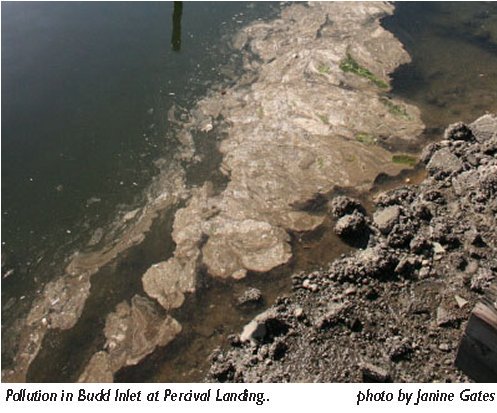|
"a bi-monthly journal of environmental news and commentary..."
It Could Happen Here! Preventing Oil Spills in Puget SoundBy Gabrielle Byrne
 Just how close are we to an oil spill disaster in Puget Sound? Well, Puget Sound and the Northwest Straits are among the busiest shipping lanes in the world. Fifteen billion gallons of oil move across the waters of Puget Sound in ships every year. Our five huge refineries receive tanker-loads of Alaskan oil hundreds of times every year. And cargo ships of all kinds - accounting for thousands of trips in Puget Sound each carry enough fuel to devastate Puget Sound should a spill occur. Just how close are we to an oil spill disaster in Puget Sound? Well, Puget Sound and the Northwest Straits are among the busiest shipping lanes in the world. Fifteen billion gallons of oil move across the waters of Puget Sound in ships every year. Our five huge refineries receive tanker-loads of Alaskan oil hundreds of times every year. And cargo ships of all kinds - accounting for thousands of trips in Puget Sound each carry enough fuel to devastate Puget Sound should a spill occur.
Even in the best-case scenario, efforts to clean up a spill result in recovery of no more than 12% of the oil spilled. Also important to note is that, as a deep fjord, with very slow circulation, any contamination of Puget Sound is compounded by the long residence time of contaminants.
So what has been done and what can be done to prevent a tragic oil spill in Puget Sound?
- In 2004, People For Puget Sound successfully led an effort to pass legislation imposing requirements on shippers to "pre-boom" vessels when they transfer oil to and from onshore facilities like refineries. Under this approach, vessels are encircled with containment booms before oil is transferred. Oil transfers are one of the major causes of spills in Washington and around the world and this prevention program is now recognized as one of the best in the world.
- In 2007 People For Puget Sound worked to ensure that the state adopted strong regulations requiring oil companies and other shippers to stockpile cleanup gear and to train regularly to prepare for a spill. These regulations were adopted.
- Oil Spill Rescue Tug – In 2009, People For Puget Sound, after a ten year endeavor, successfully led the effort to pass legislation requiring oil companies and other shippers to station a "rescue tug" at Neah Bay. The rescue tug functions in much the same way a fire engine does. It stands by, ready to assist vessels that lose power or are otherwise disabled and risk running aground. Groundings are a major cause of spills around the world. -}
Looking forward, it will be very important to work with legislature and the state Department of Ecology to strengthen plans and secure funding to make sure that the 2007 "stock-piling" regulations and the 2004 "pre-booming" regulations can be effective. This will require a strong commitment to spill prevention in Puget Sound. Securing adequate funding will be a critical and necessary focus. You can get more involved in this effort by contacting People For Puget Sound (rattemann@pugetsound.org). For information on the recent Assessment of Capacity in Washington State to Respond to Large-Scale Marine Oil Spills, go to: http://www.psp.wa.gov/downloads/OSAC/osac_archive_20090701/assets/pdf/20090420press.pdf
Also of note is a federal Senate Bill that would ban oil drilling off the West Coast permanently. This measure would amend an existing act, the Outer Continental Shelf Lands Act, to permanently ban drilling off the coasts of Washington, Oregon and California. Senators from all three states are sponsoring the bill: Dianne Feinstein and Barbara Boxer (CA); Maria Cantwell and Patty Murray (WA); and Ron Wyden and Jeff Merkley (OR).
Gabrielle Byrne works for People For Puget Sound, gbryne@pugetsound.org, (360) 754-9177.
Back to Home page.
|

 Just how close are we to an oil spill disaster in Puget Sound? Well, Puget Sound and the Northwest Straits are among the busiest shipping lanes in the world. Fifteen billion gallons of oil move across the waters of Puget Sound in ships every year. Our five huge refineries receive tanker-loads of Alaskan oil hundreds of times every year. And cargo ships of all kinds - accounting for thousands of trips in Puget Sound each carry enough fuel to devastate Puget Sound should a spill occur.
Just how close are we to an oil spill disaster in Puget Sound? Well, Puget Sound and the Northwest Straits are among the busiest shipping lanes in the world. Fifteen billion gallons of oil move across the waters of Puget Sound in ships every year. Our five huge refineries receive tanker-loads of Alaskan oil hundreds of times every year. And cargo ships of all kinds - accounting for thousands of trips in Puget Sound each carry enough fuel to devastate Puget Sound should a spill occur.